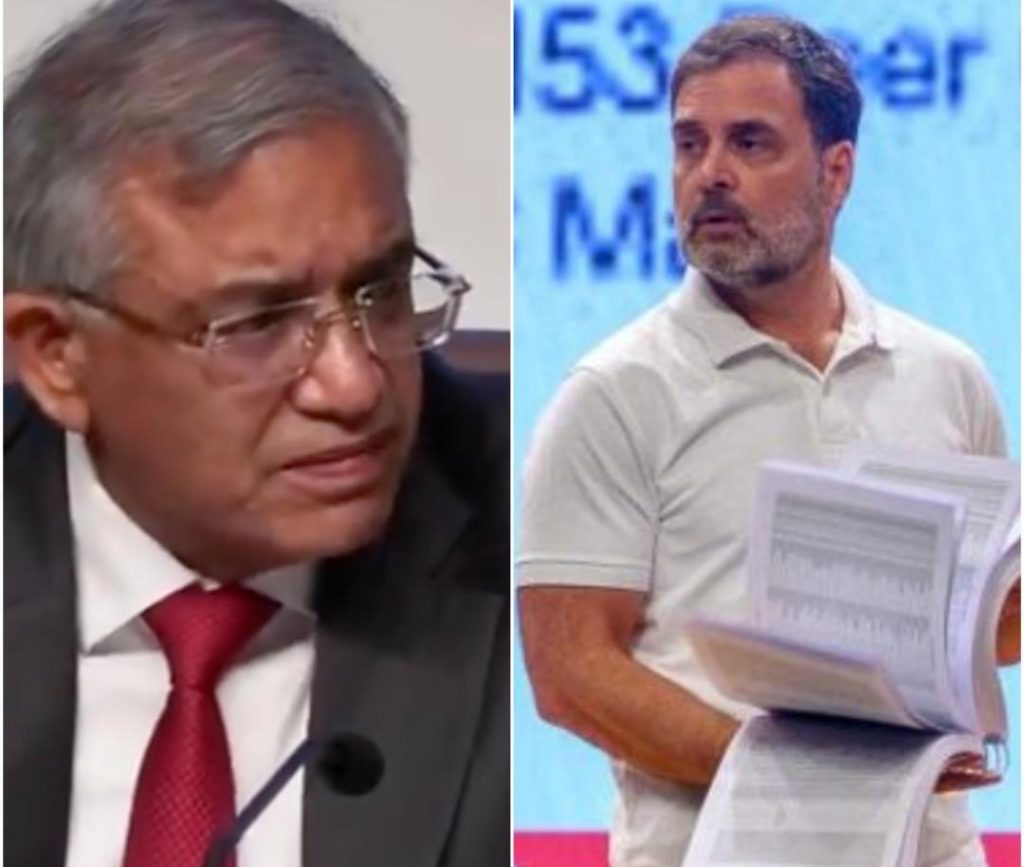
Title: “Vote Chori” Phrase an Insult; Should We Share CCTV Footage of Mothers & Sisters Voting?: EC
The recent elections in India have been marred by controversy, with political leaders on both sides leveling allegations of rigging and fraud. The latest salvo came from Congress leader Rahul Gandhi, who used the term “vote chori” (vote theft) to claim that the elections are rigged. However, the Chief Electoral Officer (CEO) of India, Gyanesh Kumar, has criticized the phrase, calling it an insult to the Constitution. In a recent statement, he also raised concerns about the privacy of voters, particularly women, and questioned whether it’s appropriate to share surveillance footage from polling booths.
The “vote chori” phrase has been widely used by opposition leaders to accuse the ruling party of manipulating the electoral process. Rahul Gandhi, in particular, has been using the term to claim that the elections are rigged and that the ruling party is suppressing opposition voices. However, the CEO has taken umbrage with the phrase, saying that it is an insult to the Constitution and the democratic process.
“It is an insult to the Constitution and the democratic process to say that the elections are rigged,” Kumar said in a statement. “The Constitution provides for free and fair elections, and the Election Commission ensures that the elections are conducted in a free and fair manner.”
Kumar’s statement comes at a time when the country is witnessing a surge in political polarization, with political leaders on both sides accusing each other of rigging the elections. The CEO’s criticism of the “vote chori” phrase is seen as a bid to maintain the integrity of the electoral process and ensure that political leaders respect the democratic norms.
However, Kumar’s statement has also sparked a debate about the release of surveillance footage from polling booths. Some political leaders have demanded that the Election Commission release the CCTV footage to show that the elections are free and fair. However, Kumar has raised concerns about the privacy of voters, particularly women, and questioned whether it’s appropriate to share the footage.
“Should we share the CCTV videos of any voter, including their mothers, daughters-in-law?” Kumar asked in his statement. “Is it appropriate to share the footage of a woman voting? Should we compromise the privacy of voters for the sake of political propaganda?”
Kumar’s concerns about voter privacy are valid, given the sensitive nature of the information that is captured on CCTV footage. If the footage is released, it could potentially compromise the privacy of voters, particularly women, who may be vulnerable to harassment or intimidation.
Moreover, releasing the footage could also lead to misuse by political parties, who could use it to intimidate or harass voters. In a country where violence and intimidation are not uncommon during elections, releasing the footage could have serious consequences for the safety and security of voters.
In conclusion, the “vote chori” phrase is an insult to the Constitution and the democratic process, and political leaders should refrain from using it to create unnecessary controversy. While the demand for releasing surveillance footage from polling booths may seem justified, the CEO’s concerns about voter privacy are valid, and the Election Commission should not compromise the privacy of voters for the sake of political propaganda.
As the country prepares for the next round of elections, it is essential that political leaders maintain a responsible and respectful tone, and avoid using inflammatory language that could create unnecessary tension and controversy. The Election Commission, on its part, should ensure that the electoral process is free and fair, and that the privacy of voters is protected.






